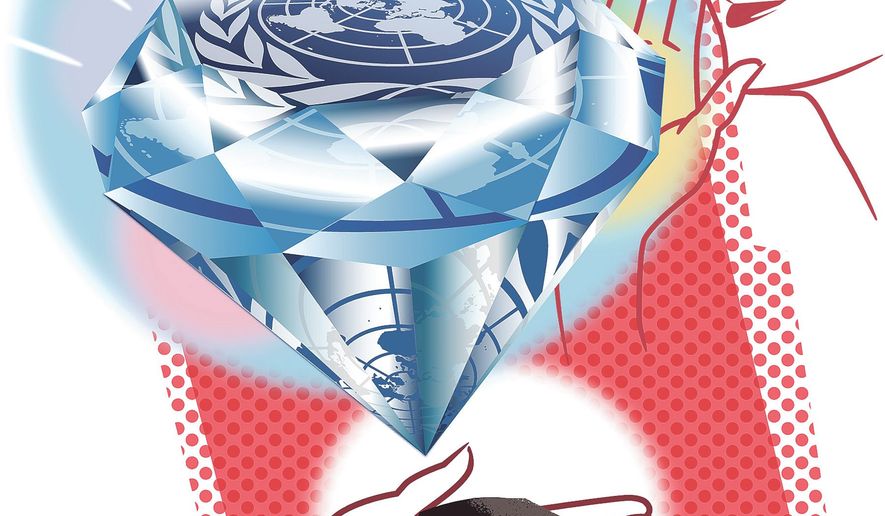OPINION:
This may come as a shock: It’s possible, not likely but possible, that a committee of officials from the Defense, State and Justice Departments, as well as the National Security Council, will conduct a review of the disproportionate funding the United States provides to the United Nations and, hold onto your hats, come to the conclusion that American taxpayers should spend less on an organization that is inefficient, corrupt and inimical to American interests.
Nikki Haley, the newly confirmed American ambassador to the U.N. hinted at this radical departure from tradition when she said on Jan. 18 that while she would oppose “slash and burn cuts” to the U.N., she did want to ensure that the U.S. “gets what it pays for.”
One week later, The New York Times reported that it had “obtained” (in other words, someone in the government had leaked) copies of a “draft” executive order (in other words, an unapproved working document) that would “clear the way to drastically reduce the United States’ role in the United Nations and other international organizations.”
Serious question: Is The New York Times correct to assert that paying less means playing a reduced role? The United States gets one vote on the Security Council — just like Russia and China. The U.S. gets one vote in the General Assembly — just like Iran and Venezuela. How much money we fork over doesn’t change that.
The New York Times warned that such cuts “could severely curtail the work of United Nations agencies, which rely on billions of dollars in annual United States contributions for missions that include caring for refugees.” Second serious question: Are there no other nations that could pick up the slack when it comes to funding efforts to care for refugees? No European nations, no members of the Arab League or the Organization of Islamic Cooperation?
The Guardian, a British newspaper, jumped into the controversy, reporting that “U.S. allies have reacted with a mix of alarm and skepticism.” An unnamed “senior European diplomat” said: “It would potentially be brutal.” I hope you’re not so cynical as to think that unnamed senior European diplomats throw such terms around lightly.
Should the president sign the draft order, funding could be terminated to any international agency that contributes to systematic violations of human rights, is controlled by a state that sponsors terrorism, supports activities that circumvent U.S. sanctions against Iran or North Korea, gives full membership to the Palestinian Authority, or funds abortions.
Third serious question: Based on the results of the last election, why should such organizations and activities continue to be funded by Washington?
The U.N. was founded, in the immediate aftermath World War II, by statesmen with the best of intentions. Its charter sought to “reaffirm faith in fundamental human rights, in the dignity and worth of the human person, in the equal rights of men and women and of nations large and small.”
A fourth serious question: Can anyone seriously argue that the U.N. is achieving these goals?
Among the recently elected members of the U.N. Human Rights Council: China, Cuba, Qatar, Saudi Arabia and Venezuela. The U.N. has never taken serious actions against genocide (e.g., in Cambodia, Rwanda, the Balkans, Sudan or Syria), nor against states supporting terrorism (e.g., Iran). Demonizing and delegitimizing Israel appears to be its main occupation.
Since the 1990s there have been serious allegations of U.N. peacekeepers sexually abusing women and girls in the Central African Republic, Bosnia, Liberia, Cambodia and other countries. Studies have identified U.N. peacekeepers as the source of the cholera outbreak that left more than 8,000 dead in Haiti a few years back.
Reports of mismanagement, corruption and fraud throughout the organization have been numerous. Calls for reform and transparency have been unavailing. Does this really sound like a good investment for Joe and Jane Taxpayer?
Which raises a fifth serious question: How much are we paying? According to estimates by Heritage Foundation scholar Brett D. Schaefer, the U.S. shells out “approximately $8 billion a year in mandatory payments and voluntary contributions to the United Nations and its affiliated organizations.” That’s more than is contributed to the U.N. by 183 of the U.N.’s 193 members — combined.
There’s also this: Under U.N. rules, the 129 member states that contribute less than 1.3 percent can pass budgets over the objections of the United States and other nations that contribute much more. Mr. Schaefer writes: “This explains why so many member states are blas about increases in the U.N. budget: The financial impact on them is minuscule and undermines incentives for them to fulfill their oversight role.”
It strikes me as telling that not one of the articles I’ve read in the major media lamenting the possibility of cuts by the United States to the U.N. bothers to mention how much the U.N. spends or how much the U.S. pays.
A piece in The New York Times does note that the U.S. provides the lion’s share of the funding for U.N. peacekeeping operations, adding: “At least one of these, the operation in southern Lebanon, directly serves Israeli interests by protecting the country’s northern border, though the draft order characterizes the funding cuts as serving Israeli interests.”
A not quite serious question: Has the Times laid off its fact-checkers? It’s no secret that the Blue Helmets in southern Lebanon have become protectors of Hezbollah, the Iranian-funded terrorist group that rules the area. Following the 2006 war they were given a mission: to ensure that Hezbollah did not rearm. Hold onto your hats again because I’m going to tell you how that’s worked out: Under the very noses of those peacekeepers, Hezbollah has installed more than 100,000 missiles in homes, schools, hospitals and mosques — all pointing at Israel.
• Clifford D. May is president of the Foundation for Defense of Democracies and a columnist for The Washington Times.




Please read our comment policy before commenting.